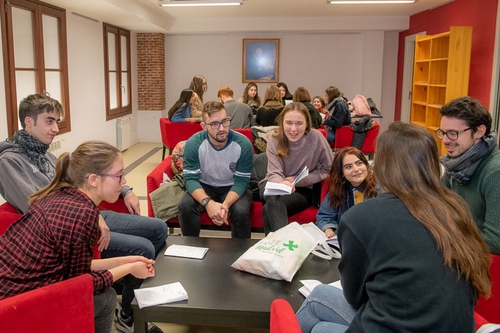Commented Bible Passages
May
Jesus said, “Come to me, all you who are weary and burdened, and I will give you rest. Take my yoke upon you and learn from me, for I am gentle and humble in heart, and you will find rest for your souls. For my yoke is easy and my burden is light.” (Matthew 11:28-30)
In a sense, we are all weary and overburdened. In our depths lies hidden a poverty which, because it frightens us, oppresses us and drags us down. In the words of this passage, Christ welcomes us in our vulnerability and does not seem to be afraid of it. “Come to me,” he says, and later on he will say: “Let the little children come to me, for the Kingdom of God belongs to those who are like them” (Matthew 19:14).
Jesus seems to want to teach us to offer this inner poverty to God. It is God alone who can cover it with the right garment. Accepting our inadequacies, Christ takes upon himself what hurts us in ourselves.
And Jesus’ proposal goes even further: our shoulders do not remain empty for long. Once we have entrusted our burden to him he gives us another one, which seems to be even heavier. Jesus calls this new load a yoke, the name of the large piece of wood which connects two oxen to each other to plow or to tow something.
We are thus brought from a solitary effort to a common effort. Becoming an ox with Christ is a striking image. It recalls the image used by the prophet Isaiah, that of a suffering servant burdened with the faults of others.
Working in tandem, making a joint effort: this gesture is what connects us to God. Not only is God unafraid of our poverty, but in addition he invites us to undertake with him the great work he is accomplishing in the world: to liberate by bearing the burdens of others, especially the self-imposed burdens that are sometimes borne out of self-contempt.
This task is not one that we can achieve by ourselves. If I try to carry myself, often I will simply become a caricature of myself, so caught up in my own preoccupations that I forget everybody else or, even worse, become a burden to them. Listening to Jesus’ words, we are called rather to divest ourselves of our own worries and to accept Christ’s concerns in their place, to take upon ourselves a burden that, paradoxically, lightens our load.
This exchange recalls the very significance of Jesus’ life. In the first centuries, people dared to express it like this: Christ clothed himself with our humanity in order to clothe us with his divinity. In this way, he turns us into kings who have nothing greater to do than to carry the burdens of the little ones. Let us then offer our shoulders so that human beings are no longer victims of themselves. This is a kingly service, the beginning of the great liberation. It is the coming of the Kingdom.
![]() If I look at my personal life, what are the burdens I have to bear for others? Are they related to Christ’s “yoke”?
If I look at my personal life, what are the burdens I have to bear for others? Are they related to Christ’s “yoke”?
![]() How can we live in the best way possible the dimension of concern, of worrying about others that is part of a relationship of love?
How can we live in the best way possible the dimension of concern, of worrying about others that is part of a relationship of love?
 TAIZÉ
TAIZÉ